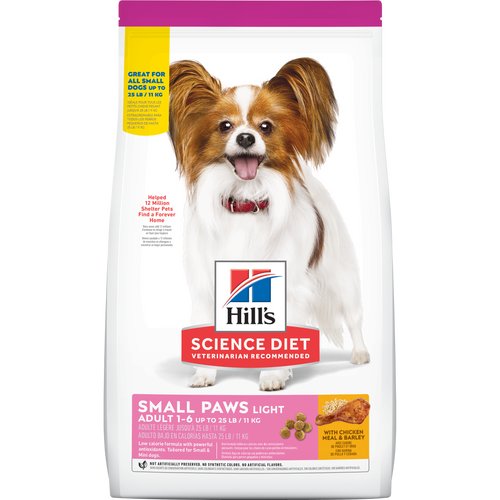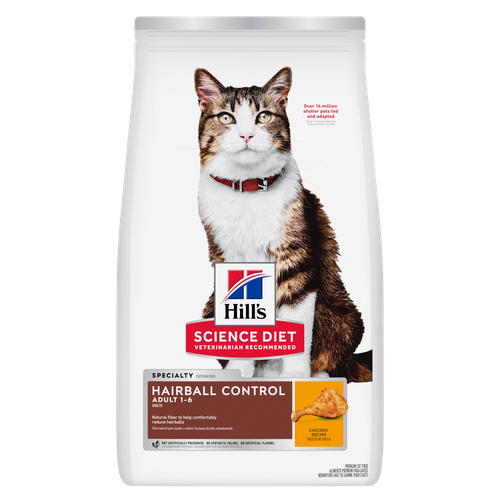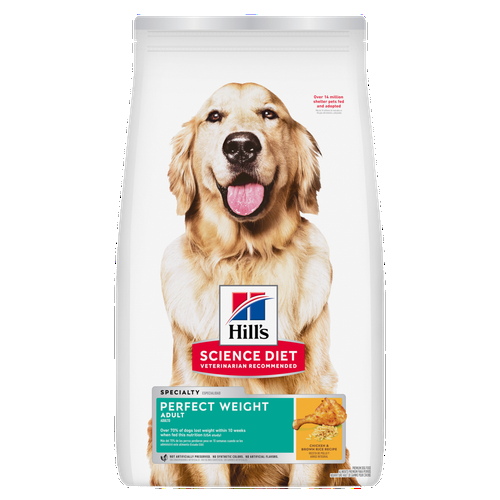
-
Find the right food for your petTake this quiz to see which food may be the best for your furry friend.Find the right food for your petTake this quiz to see which food may be the best for your furry friend.Featured products
 Hill's Science Diet Adult Oral Care Chicken, Brown Rice & Barley Recipe Dog Food
Hill's Science Diet Adult Oral Care Chicken, Brown Rice & Barley Recipe Dog FoodClinically proven kibble technology to reduce plaque & tartar build-up
Shop Now Adult Light Small Paws with Chicken Meal & Barley Dog Food
Adult Light Small Paws with Chicken Meal & Barley Dog FoodLow calories for less active small & mini dogs
Shop Now Adult Perfect Digestion Salmon, Whole Oats, and Brown Rice Recipe Dog Food
Adult Perfect Digestion Salmon, Whole Oats, and Brown Rice Recipe Dog FoodScience Diet's breakthrough nutrition supports ultimate digestive well-being & healthy microbiome
Shop NowFeatured products Adult 7+ Chicken Recipe cat food
Adult 7+ Chicken Recipe cat foodSupports energy level and beautiful fur in mature cats
Shop Now Adult Hairball Control Chicken Recipe Cat Food
Adult Hairball Control Chicken Recipe Cat FoodNatural fiber to help comfortably reduce hairballs
Shop Now Adult Perfect Weight Chicken Recipe Dog Food
Adult Perfect Weight Chicken Recipe Dog FoodOver 70% of dogs lost weight within 10 weeks when fed this nutrition (USA Study)
Shop Now -
Dog
- Dog Tips & Articles
-
Health Category
- Weight
- Food & Environmental Sensitivities
- Urinary
- Digestive
- Joint
- Kidney
-
Life Stage
- Puppy Nutrition
- Adult Nutrition
- Senior Nutrition
Cat- Cat Tips & Articles
-
Health Category
- Weight
- Skin & Food Sensitivities
- Urinary
- Digestive
- Kidney
-
Life Stage
- Kitten Nutrition
- Adult Nutrition
Featured articles Moving With a Pet: A How-To Guide
Moving With a Pet: A How-To GuideDiscover helpful tips for moving with your pet including safety recommendations to keep in mind on moving day & pet behavior to watch for at your new home.
Read More Keeping Pets Calm During Thunderstorms
Keeping Pets Calm During ThunderstormsIs your dog scared of thunder? Does your kitty dart under the bed at the first rumble? Learn a few tips for keeping your pets calm during the storm.
Read More How to Reduce Your Pet's Carbon Paw Print
How to Reduce Your Pet's Carbon Paw PrintHeaded outside? How you and your pets engage with nature can affect the environment, so here are some quick tips for reducing your pet's carbon paw print.
Read More -


Dogs in heat
Female dogs are "in heat" when they have entered the fertile part of their reproductive cycle. A heat lasts for 3 weeks on average and a dog will usually go into heat every 6 to 8 months.
Most breeds have their first heat at about 6 months old but it may be earlier or later.
A heat can usually be identified when there is some bleeding from the vagina, a swollen vulva or increased urination. Female dogs do not produce very much blood however, and in a small dog you may not even notice the bleeding.
Unwanted attention
The first thing you will notice if you have a bitch in heat is that she will attract un-castrated male dogs within a very large radius. Her behaviour will change too, so while she normally wouldn't let males mount her, she almost definitely will while in heat.
Additionally, male dogs will go to surprising lengths to get to a female in heat. While your bitch is in heat it's inadvisable to leave her unsupervised outside, and you'll need to keep her on the lead at all times while on walks. In general, other pet owners you encounter will be able to control their dogs, but the scent of a female in heat can cause aggressive behaviour in some dogs.


Tasty Tips
Bleeding
The second concern is bleeding. If your dog is producing enough blood to cause a mess you may want to restrict her to easy- to -clean, un-carpeted floors. Just leaving her outside is a bad idea unless you want her to have male visitors (and potentially puppies).
Unless you intend breeding, it is best to have her spayed. Spaying will prevent her from going into heat.
There is some debate about when it is best to spay your bitch. Some veterinarians will advise to let a dog have one heat while others will spay as early as 6 months. Ask your vet which course of action they think is right for your dog.


One of our staff authors prepared this article for you
Related products

Clinically proven kibble technology to reduce plaque & tartar build-up

For the unique nutritional needs of mature Small & Mini Dogs

Science Diet's breakthrough nutrition supports ultimate digestive well-being & healthy microbiome

Low calories for less active small & mini dogs
Related articles

Understand the role that Omega-6 and Omega-3 fatty acids play in your dog's overall health, and how you can ensure they are getting enough.

Learn about Hill's puppy food and the nutritional benefit & high quality ingredients that it contains for your pup.

Your dog's coat and skin are a big part of your dog's overall health. Ensure you keep your dog's coat healthy, by following these simple tips.

Proper nutrition for your pregnant or nursing dog is vital to her and her puppy's health. Learn what you should do provide her with the proper nutrients.

Put your dog on a diet without them knowing
Our low calorie formula helps you control your dog's weight. It's packed with high-quality protein for building lean muscles, and made with purposeful ingredients for a flavorful, nutritious meal. Clinically proven antioxidants, Vitamin C+E, help promote a healthy immune system.
Put your dog on a diet without them knowing
Our low calorie formula helps you control your dog's weight. It's packed with high-quality protein for building lean muscles, and made with purposeful ingredients for a flavorful, nutritious meal. Clinically proven antioxidants, Vitamin C+E, help promote a healthy immune system.

